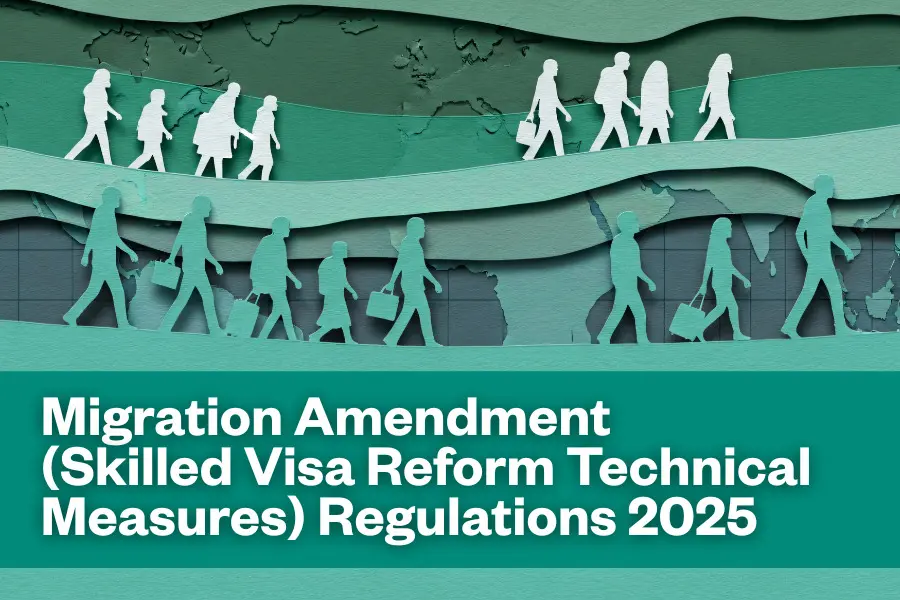The Migration Amendment (Skilled Visa Reform Technical Measures) Regulations 2025 introduce important changes to the Migration Regulations 1994, focusing on the Subclass 482 SID visa and the Employer Nomination Scheme (ENS) Subclass 186 Temporary Residence Transition (TRT) stream. These changes, effective 29 November 2025, are largely technical but carry significant implications for employers, skilled visa holders, and those planning permanent residency in Australia.
The reforms aim to streamline the skilled visa framework, clarify eligibility criteria, and ensure that both employers and visa holders meet their obligations under Australia’s migration law. For employers sponsoring temporary skilled workers, understanding these changes is critical to maintaining compliance and supporting their employees’ long-term residency pathways.

ENS Subclass 186 TRT: Work Experience Must Be with an Approved Sponsor
One of the most significant changes under the 2025 Regulations affects the ENS 186 TRT stream. Previously, work experience for ENS TRT applications could sometimes be counted even if it was performed for an employer who was not an Approved Work Sponsor at the time. From 29 November 2025, only work experience gained while employed by an Approved Work Sponsor will count toward the two-year work requirement.
Implications for employers:
- Employers must maintain a valid sponsorship or labour agreement for the entire duration of a visa holder’s employment.
- If a sponsorship lapses or is cancelled, work performed during that period will not contribute to ENS TRT eligibility.
- Employers should consider renewing sponsorship approvals well in advance to avoid gaps that could negatively affect employees.
Implications for visa holders:
- Under Condition 8107, visa holders can temporarily work for another employer for up to 180 days without affecting their SID visa. However, to count toward ENS TRT eligibility, they must eventually be nominated by an approved sponsor.
- Only work experience in the nominated occupation and with an Approved Work Sponsor will now count toward permanent residency requirements.
This change highlights the importance of careful planning for both employers and skilled workers, particularly those considering the ENS TRT pathway to permanent residency.
SID Visa: Cancellation Powers
The 2025 amendments explicitly extend cancellation powers to the Subclass 482 SID visa. A SID visa may now be cancelled if a sponsor:
- Provides false or misleading information
- Fails to meet sponsorship obligations
- Has sponsorship approval cancelled or barred
- Experiences cessation, suspension, or expiry of a relevant labour agreement
These powers apply to all SID visas, including those granted before, on, or after 29 November 2025, provided the cancellation decision occurs on or after this date.
Definitions for Sponsored Workers and Employer Obligations
The regulations also clarify that primary and secondary sponsored persons now explicitly include SID visa holders and their family members. This ensures sponsorship obligations extend consistently to all individuals under a labour agreement, including dependent family members.
For employers, this means greater responsibility to maintain compliance, as lapses can directly impact employees’ visa status and potentially their eligibility for permanent residency.
The amendments clarify the sponsorship obligations end once the sponsor has met key requirements, such as paying any outstanding travel costs or when their authority to supervise the visa holder ceases.
Review Rights for SID Visa Holders
Decisions refusing a SID visa application lodged outside Australia will now fall within the Administrative Review Tribunal (ART) review scheme, providing visa applicants with formal review rights for decisions made on or after 29 November 2025.
This ensures that both employers and visa holders have access to a clear and fair process for addressing refusals, improving transparency and accountability in the skilled migration system.
Implications for Employers and Visa Holders
The amendments have several key implications:
- Employers must ensure sponsorships and labour agreements remain valid for the duration of employment.
- Only work experience gained with an Approved Work Sponsor in the nominated occupation will count toward ENS TRT eligibility.
- Employers and visa holders must understand cancellation, sponsor obligations, and review rights now explicitly applying to SID visa holders.
For visa holders, these changes may affect eligibility for ENS TRT pathways, particularly if they have previously worked for a sponsor whose approval has lapsed. Proper planning, timing, and documentation of employment history will be critical to meeting permanent residency requirements.
Employers should also proactively communicate with employees about the potential impact of sponsorship lapses and the importance of staying within approved employment arrangements.
What NB Migration Law Thinks About the Migration Amendment (Skilled Visa Reform Technical Measures) Regulations 2025
NB Migration Law advises that both employers and visa holders take a proactive approach in response to these reforms. Employers should review all sponsorship approvals and labour agreements to ensure continuity and compliance. Visa holders and employers alike should plan ENS Subclass 186 TRT applications carefully, noting that only work experience gained with an Approved Work Sponsor will now count toward the two-year requirement.
Furthermore, expert guidance is strongly recommended to navigate updated SID visa cancellation powers, review rights, and employer obligations. The skilled visa landscape continues to evolve and staying informed and proactive is essential to ensuring smooth pathways from temporary skilled visas to permanent residency under the ENS pathway.
NB Migration Law considers these reforms a positive step toward clarity and fairness in the migration system but emphasizes that careful planning and professional advice are key to mitigating risks and maintaining eligibility.
